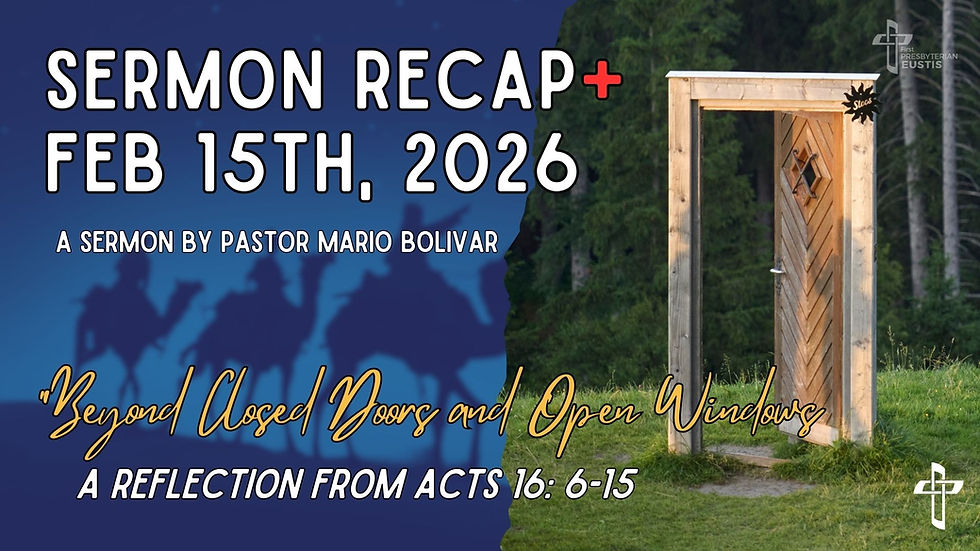Sermon Recap+ Aug 19, 2025
- Mario Bolivar
- Aug 19, 2025
- 4 min read
Let us explore the concepts of spiritual growth, heavenly citizenship, and the importance of letting go of what weighs us down. (See, Philippians 3:12-21) And while we do that, let us remember that Paul writes from a place of discomfort, but with lots of purpose.
Not Perfection, But Growth
Paul makes it clear that he hasn't reached perfection in his spiritual journey. He writes, "Not that I have already obtained this or have already reached the goal, but I press on to make it my own." This admission is significant because it shows that even Paul, a spiritual giant, acknowledges his ongoing need for growth. We all carry parts of our old selves with us. Just as Paul still carried elements of his former self (Saul), we too bring our past experiences, habits, and tendencies into our Christian walk. The key isn't to achieve instant perfection but to continually press forward in growth.
What Does Heavenly Citizenship Mean?
Paul presents a challenging concept: "Our citizenship is in heaven." This raises important questions for believers today:
Are you a citizen of heaven?
What evidence do you have of this citizenship?
How does your heavenly citizenship reshape your concrete choices this week?
For those who are naturalized citizens of a country, there's often a requirement to renounce other citizenships. In the United States, for example, you must pledge allegiance solely to America. This creates an interesting tension with the concept of heavenly citizenship.
Signs of Heavenly Citizenship
If you are truly a citizen of heaven, your life should show certain characteristics:
You think, speak, and project generosity rather than seeking comfort
You thrive in encouragement rather than complaint
Your spiritual growth is quantifiable rather than marked by complacency
You have a mindset of gratitude rather than constantly comparing yourself to others
You develop unique relationships that reflect loving God and loving neighbors
Are You an Example Worth Following?
Paul challenges the Philippians (and us) to consider whether we're good examples as citizens of heaven. He writes, "Brothers and sisters, join in imitating me and observe those who live according to the example you have in us."
This raises uncomfortable but necessary questions:
Does your faith match your actions, and your actions your faith?
Are you an example of the gospel or an example of what not to follow?
Can people recognize you as a Christian by your fruits without you having to tell them?
Jesus frequently preached against the hypocrisy of those who claimed to believe in God but whose lives didn't reflect their professed faith. Our lives should demonstrate authentic citizenship in God's kingdom.
What Do You Need to Let Go?
Perhaps the most challenging aspect of Paul's message is his call to let go of what weighs us down: "Forgetting what lies behind and straining forward to what lies ahead, I press on toward the goal." We all carry burdens that hinder our spiritual growth:
Some struggle with the traditional "deadly sins" like greed, pride, or lust
Others battle the desire for control, power, or wealth
Many carry hidden biases we may not even recognize
Past hurts, resentments, and painful memories can weigh us down
Paul's instruction is clear: we must identify and release these burdens to move forward effectively in our faith journey.
The Weight We Don't Know We Carry
Sometimes the most dangerous burdens are those we don't even recognize. Our brains are conditioned to find evidence that supports what we already believe. Like a search engine that shows results based on your previous searches, our minds filter information to confirm existing biases. This raises an important question: How can you know what you don't know? Without outside perspective and honest self-examination, we may carry weights we're completely unaware of.
Freedom Through Letting Go
God wants us to be free from the weights that hold us back. We weren't born with weight jackets, but as we grow older, we accumulate burdens that aren't part of who we were created to be.
These might be:
Anger from past injuries
Resentment over losses
Painful memories that need healing
Biases we've developed over time
Christ wants us to "jump and react and live and thrive." He doesn't want us carrying unnecessary weight that prevents us from being effective disciples.
The Promise of Transformation
Paul concludes with a powerful promise in verse 21: "He will transform the body of our humiliation that it may be conformed to the body of his glory by the power that also enables him to make all things subject to himself."
While we won't achieve perfection in this life, we have the assurance that Christ will ultimately transform us completely. Our goal isn't immediate perfection but continuous growth as we press on toward the goal.
Life Application
This week, consider these challenging questions:
Where does your true loyalty lie? Is your primary citizenship in heaven or elsewhere?
Are you a good example for others to follow, or are you demonstrating what not to do?
What "dead weight" do you need to identify and release to God?
How can you take one concrete step toward living as a citizen of heaven this week?
God wants to give you rest and peace because He has a purpose for you. Identify what's weighing you down, and practice letting it go. Remember, the goal isn't perfection but growth—pressing on toward the prize of the heavenly call of God in Christ Jesus.





Comments